Mysuru: Even as writer, diplomat and politician Pavan Varma’s lucid exposition of Adi Shankaracharya ended with very many insights into one of Hinduism’s greatest thinkers and how relevant is his thoughts in today’s world, the next panellist Prof. G. N. Devy, a writer and a critic, bounced a lot of ideas about the current scenario in the country about mobs, mobiles and declining diversity at the Second Mysuru Literary Fest held at the Senate Bhavan in Manasagangothri yesterday under the auspices of Mysore Literary Association (MLA).
Beginning his talk on how the British had introduced the Criminal Tribal Act in 1871, he said that this led to classifying a particular community of people who may or may not have indulged in criminal acts. But similar forms of the mob mentality in the 19th century in America was witnessed following the gold rush and also in Australia and other parts of the world, he said.
There was a time when mobs destroyed human beings as citizens and today citizens are being turned into mobs and hence there is something going wrong somewhere in the world and this leads to the next question ‘has something gone wrong with the memory of the world,’ said Prof. Devy.
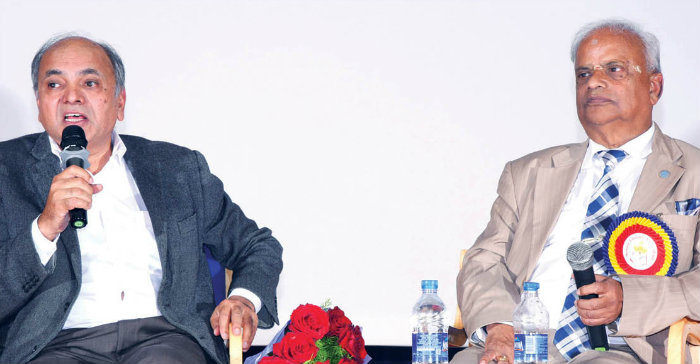
Prof. G. N. Devy seen interacting during the Literary Fest as MLA member Prof. B.N. Balajee looks on.
In the last 30 years, man has outsourced memory to make chips. Telephone, which was an instrument of communication has now completely changed with the advent of mobiles which has become an extension of human brains, he opined.
Recalling that it is the 75th anniversary of the death of Kasturba Gandhi, who died in Aga Khan Palace in Poona and Gandhi had to leave the place alone later, Prof. Devy, with a tinge of sadness, said that if today, he spoke about Gandhi he would be branded an anti-national.
Talking about the cultural diversity of the country, he pointed out that it is dwindling at a speed comparable to the national diversity dwindling and how even a deliberate attempt is being made to dump many languages and only 121 are now declared as languages of India.
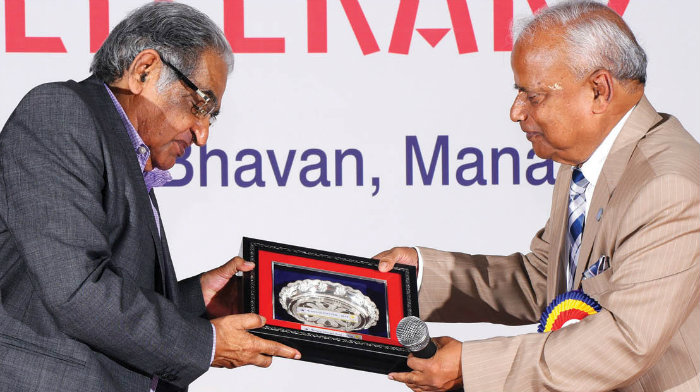
Prof. B.N. Balajee presenting memento to Prof. V.K. Natraj (left).
In the afternoon session, this talk was followed by Prof. V.K. Natraj’s “Equity through discrimination: India’s Quest” where the word equity is being used in social sciences and equity is considered as equality.
Quoting his friend Prof. C.K.N. Raja, he said that just by school children wearing uniform does not guarantee uniformity similarly, just by announcing that everybody is equal does not solve the problem.
Arguing for the protective discrimination, Prof. Natraj said that the University of Mysore which was formed in 1916 had the first non-Brahmin Hindu Vice-Chancellor Prof. B.L. Manjuanth only in 1950. The reservation policy introduced in 1949 was meant only for ten years but the protective discrimination in education and employment, there has no time limit been set, he noted.
The first Backward Classes Commission was set up under the Chairmanship of Kaka Kalelkar where he himself had said that the remedy is worse than the disease. However, it is worthy to note that the reservations had already been implemented in States like Karnataka and Tamil Nadu and hence the Mandal Commission report which caused huge unrest in North India did not affect South India, he said.
The next session was on “Translation: Challenges” in which the panellists were Prof. Lakshmi Chandrashekar, Prof. T.R.S. Sharma and Prof. Krishna Manavalli and each one of them shared their experiences about the challenges they have faced while translating some of the best works.
Prof. Lakshmi Chandrashekar, recalling how R.K. Narayan, the great Indian novelist used the word soup for sambar or rasam as he was writing for an exclusive English speaking readers would now look funny if it is used today and added that translation is always a tight rope walk.
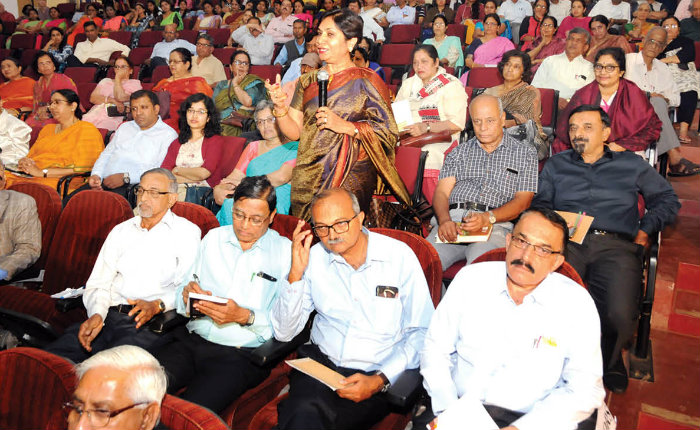
Prof. Sharma said that no translation is final.
Prof. Krishna Manavalli strongly felt that there is the politics of translation which could even become a problem and shared her experience of translating Dr. Chandrashekar Kambara’s works.
The last session “Are we a Sporting Nation” was a lively session with both former international athlete Arjun Devaiah, who is also a motivational speaker and senior sports journalist Vedam Jaishankar, coming to a consensus that if the country has to do well in sports then a lot of resources need to be put in and just a Rs.2,200 crore infused into sports will not help us getting anywhere close to producing champions in any sport.
Vedam said that the problem is finding good coaches and even a great athlete like P.T. Usha could not move up to her optimum level because her coach did not let her go.
Arjun Devaiah called for introducing sports as a subject allocating 200 marks and instead of the Government spending money ask every parent to spend just Rs.5,000 a year on their wards and see how the nation can change.

Prof. Lakshmi Chandrashekar flanked by Prof. T.R.S. Sharma and Prof. Krishna Manavalli (right) during a panel discussion.
Vedam also shared how when he spoke to one of his friend’s daughter she told him that she was doing Ph.D in Alternate History and when asked what it was all about she said that her subject was “What if Adolf
Hitler had won the Second World War, how the world would have been today?”
He said that there are many other options available; only if the economy is doing good can other options including sports as a way of life can be thought of.
If instead, sports just becomes an entertainment, then no more human relations can develop, he said. Giving the example of Barack Obama, Arjun Devaiah said that the former President of the United States had pointed out that when Sachin Tendulkar was batting the productivity rate in America went down by 5 per cent and hence he wanted to see who this Tendulkar was.
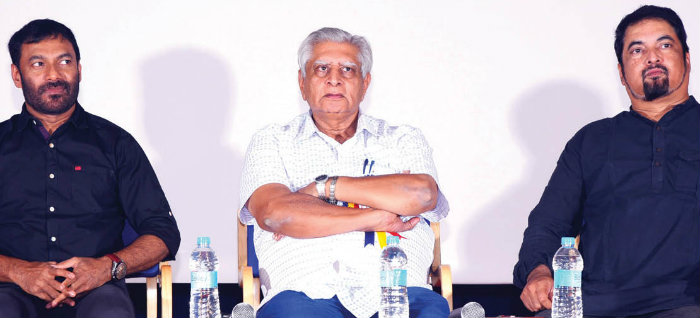
From left: International Athlete Arjun Devaiah, MLA Vice-President Dr. H.S. Shivanna and Senior Journalist Vedam Jaishankar during a session on sports.
Academician Dr. H.S. Shivanna moderated the session.
Star of Mysore was the media partner for the day-long Fest. Thus the Second Edition of Mysuru Literary Fest, well-attended by people from Mysuru, Kodagu, Bengaluru, Ooty and Goa, ended on a note of hope with lot of takeaways from all the panellists sharing their thoughts and ideas. MLA President Prof. K.C. Belliappa presided. Hon. Secretary Reginald Wesley proposed a vote of thanks.




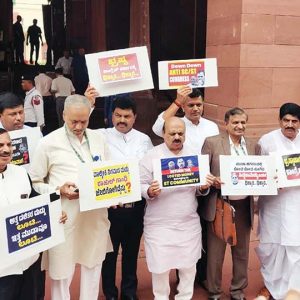
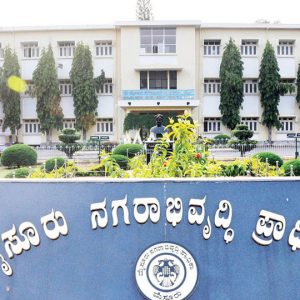
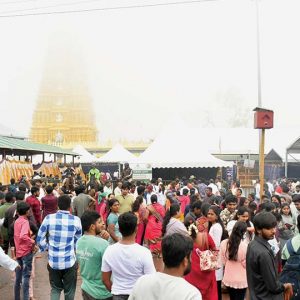
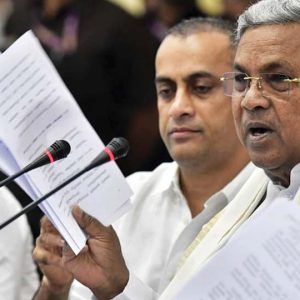
Recent Comments